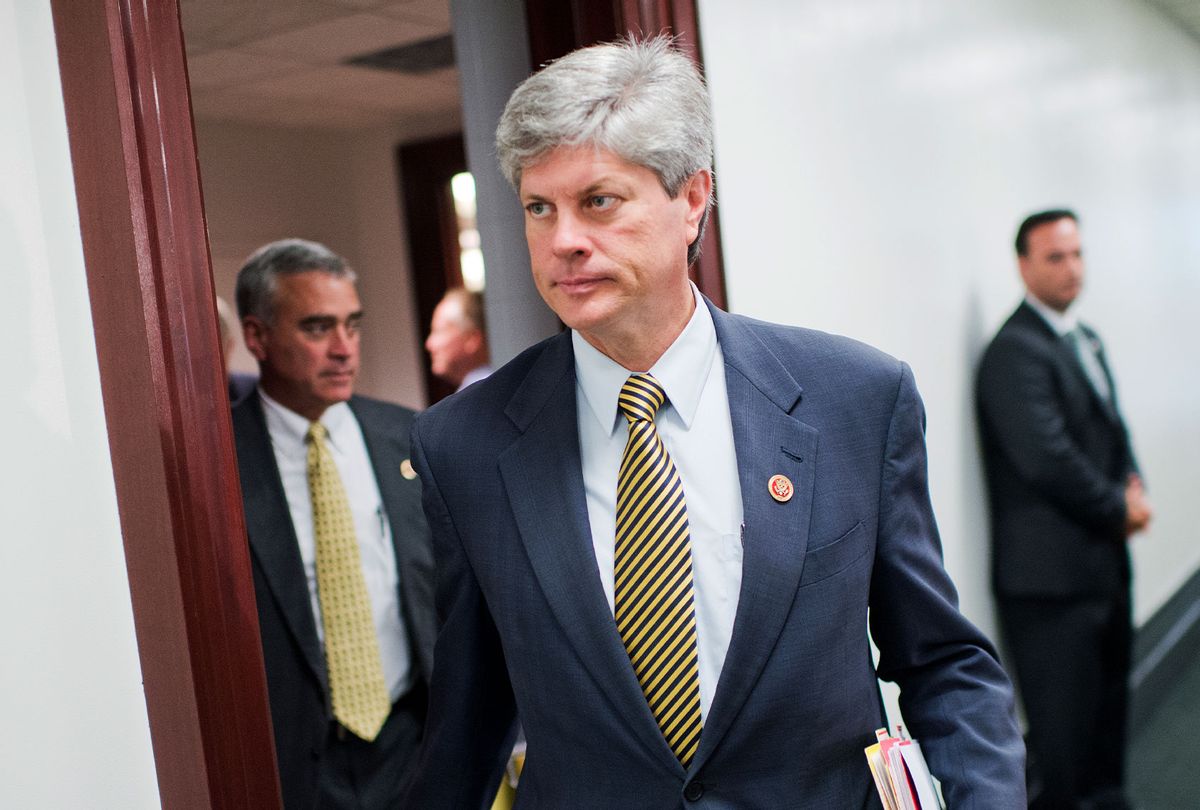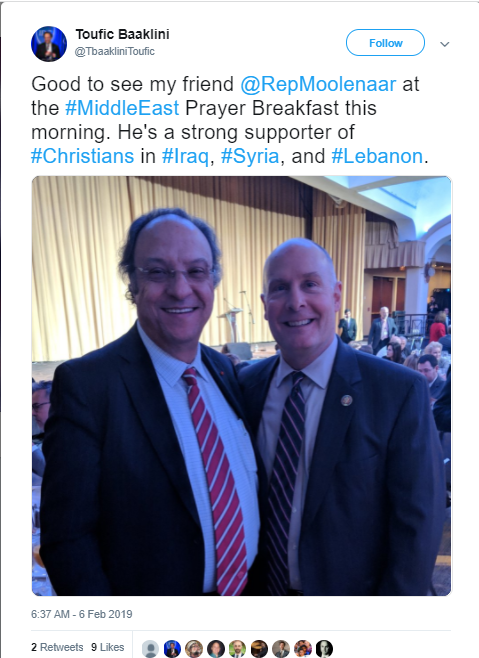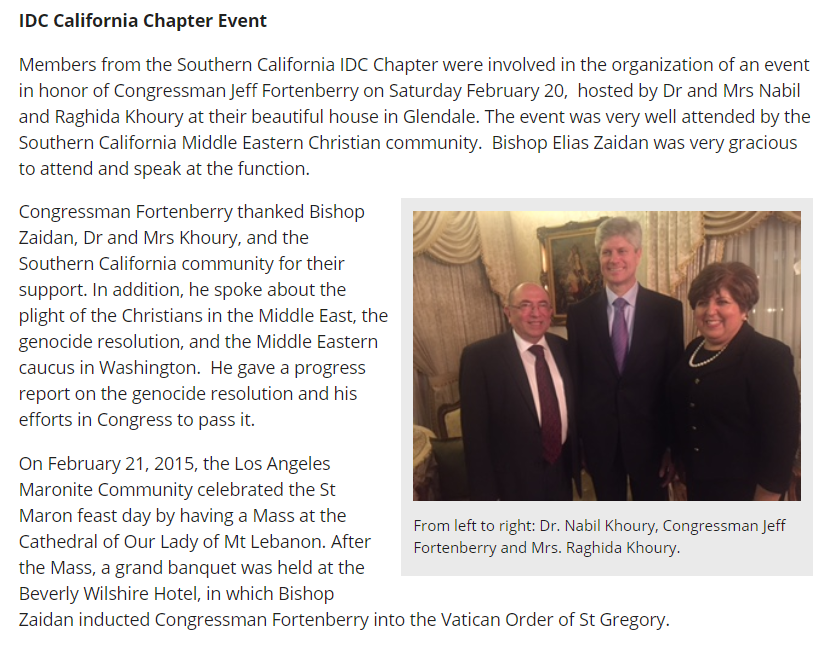One of a series about the Fellowship Foundation, the secretive religious group that runs the National Prayer Breakfast and is popularly known as The Family. This series is based on Family documents obtained by TYT, including lists of breakfast guests and who invited them.
On Tuesday, responding to federal charges that he lied about illegal contributions to his campaign, Rep. Jeff Fortenberry, R-Neb., made multiple misleading statements that served to conceal the role played by a Christian charity deeply connected to The Family.
In a video he released Tuesday, Fortenberry described key conduits for the illegal cash as "some other Americans." In fact, Fortenberry had an existing relationship with the primary middleman for the cash, a Washington, D.C., businessman named Toufic Baaklini who has ties to The Family. Fortenberry also attended the fundraiser that was staged to carry out the scheme and appears in a picture at the event with its hosts.
And the fundraiser that Fortenberry described as being held by "a Lebanese community in Los Angeles" was actually organized by a local chapter of a charity called In Defense of Christians (IDC), which Baaklini serves as president. The source of the money that Fortenberry described as "a foreign national" was a Lebanese-Nigerian billionaire who backed IDC — and was at one point on a U.S. no-fly list.
As TYT reported on Wednesday, Fortenberry has extensive ties to The Family — and so does IDC. The leadership and ranks of IDC include at least half a dozen Family friends and insiders, including some top figures in the Family.
This is also not the first time one of The Family's members of Congress has been in legal trouble for funneling money from apparently sketchy sources overseas. Last year, President Trump, a favorite of top Family insiders, pardoned former Rep. Mark Siljander, R-Mich., for virtually the same thing. (Trump on Wednesday called it "terrible" that Fortenberry was indicted for "possibly telling some lies to investigators.")
RELATED: Behind the Fortenberry scandal: Another member of secretive Christian network goes down
When TYT told Fortenberry's office we would be reporting his misleading statements, his spokesperson referred questions to Fortenberry chief of staff Andy Braner. He is also a Family insider — whose prior religious work included time in Lebanon. Braner was brought into the National Prayer Breakfast (NPB) by a Family leader, Stan Holmes, who both sits on an IDC board and has a close personal relationship with Fortenberry.
A source close to The Family told TYT, "Braner was a Stan guy. Fully brought into the NPB by Stan." Braner had attended the breakfast prior to 2016, but that year, according to a Family document obtained by TYT, it was Holmes, Fortenberry's confidant, who invited Braner. Later that year, Braner got his first gig working for Fortenberry.
Responding to the fact that Fortenberry made Braner his chief of staff last year, the source said, "What a joke. … [Braner] never would have ended up [working for Fortenberry] without the Stan/Fellowship dynamic. There is absolutely no justification for him to go from what he was doing to CoS on that timeline."
What Braner was doing prior to Fortenberry didn't involve experience in government. It was religious work, primarily with children. As Braner himself noted on his LinkedIn profile, that work included The Family as early as 2006. One of his youth programs, the source told TYT, involved "placing the kids as Hill interns."
Braner, like other individuals and institutions in this report, did not respond to TYT's questions or requests for comment.
In Defense of Christians' mission of religious freedom is a pet cause of The Family, whose leaders and associates often use it as a synonym for the right to discriminate against LGBTQ people. The National Prayer Breakfast's only donor is the powerful evangelical leader and pastor Franklin Graham — whose charities work to fight LGBTQ rights — and at least two LGBTQ advocacy organizations have warned about prayer breakfasts being used to promote right-wing causes.
A source familiar with IDC's inner workings told TYT that Baaklini and other Family friends at IDC wanted to expand their mandate to include "culture wars" here in the U.S.
Baaklini was said to have opposed taking a public stand against Trump's ban on travelers from several predominantly Muslim countries, even though the ban would also affect Christian residents of those countries. "We can't get Trump upset," Baaklini said, according to the source familiar with IDC. "He's going to be great on our issues."
Another Family insider there is said to have sidelined IDC's few Democratic staffers from key events such as the National Prayer Breakfast and the Catholic National Prayer Breakfast. (Most IDC personnel hail from well-known right-wing organizations). That same Family insider also saw little use in pursuing Democratic allies on Capitol Hill, saying, "Democrats don't care about religious freedom."
Want a daily wrap-up of all the news and commentary Salon has to offer? Subscribe to our morning newsletter, Crash Course.
Although Fortenberry's statements concealed the fact that he had a personal relationship with a key figure in the illegal campaign funding scheme, the source familiar with IDC's inner workings said Fortenberry and Baaklini "knew each other quite well."
One of The Family's most important Capitol Hill allies, and a past National Prayer Breakfast co-chair, Rep. John Moolenaar, R-Mich., also appears to have known Baaklini. In an early morning tweet from the 2019 NPB, Baaklini appears in a picture with Moolenaar, referring to the congressman as "my friend."
(Baaklini deleted his Tweet some time in the 24 hours prior to this article's publication, but it had already been archived via the Internet Archive's Wayback Machine.)
(Screengrab of archived tweet by @TbaakliniToufic.)
IDC's Board of Advisors includes two longtime Family insiders. Former Attorney General John Ashcroft was a childhood friend of a key Family leader named Dick Foth. Larry Ross, who runs a Texas public relations firm, also sits on the board of The Family's legal entity, the Fellowship Foundation. Ross has also been a spokesperson for both The Family and the presidential campaign of Dr. Ben Carson, who became a conservative cause célèbre at the 2013 National Prayer Breakfast. Last month, TYT reported on the pivotal role Ross and the breakfast played in The Family's radicalization of Big Lie promoter Mike Lindell.
Emeritus board members for the IDC include Holmes, Fortenberry's spiritual counselor. Holmes has been a Family leader, mostly behind the scenes, for decades. Having ministered weekly on Capitol Hill, he is close to Fortenberry, Moolenaar and other Family allies in Congress.
IDC's Congressional Advisory Board includes at least three Family friends or insiders, all former Republican House members: Randy Hultgren and Jerry Weller of Illinois and Frank Wolf of Virginia.
From 2014 to as recently as 2019, another key figure in the Fortenberry scandal, who also has ties to The Family, was a member of IDC's advisory board. That figure was former Transportation Secretary Ray LaHood, who has since admitted illegally accepting $50,000 from Baaklini in 2012 and failing to disclose it on the federal forms he was required to fill out as a Cabinet member.
Both LaHood and Ashcroft were on the IDC website the first time it was archived, in July 2014.
An email to the federal prosecutor in Fortenberry's case was not immediately returned. But public records — including Department of Justice documents — and the accounts of the two sources not only show that Fortenberry's public statements Tuesday were misleading at best, they offer some answers about what really happened.
Home repair and "a key guy"
A few years after becoming Pres. Obama's token Republican cabinet member, Ray LaHood "was suffering significant financial difficulties." Specifically, he needed money for home repairs.
Luckily, in his first year in office, he had met a priest at the July 2009 Annual Maronite Convention. That priest, whom prosecutors have not named, took LaHood to a gathering at a private home. A billionaire's private home.
The billionaire was Gilbert Chagoury, the Lebanese-Nigerian businessman who would later support IDC. (Chagoury was a known figure in other quarters of the Obama administration; internal State Department emails from April 2009 refer to Chagoury as "a key guy [in Lebanon] and to us.")
While LaHood is at Chagoury's house, he meets both his billionaire host and someone who worked for Chagoury: Baaklini, IDC's future president.
So, in May 2012, panicked over paying for his home repairs, LaHood asks whether his priest friend knows anyone who'd be happy to lend him $50,000. The priest reassures LaHood: He'll call Chagoury.
Two days later, the priest tells LaHood to contact Baaklini, Chagoury's man. Baaklini tells LaHood they're good to go. On June 1, 2012, LaHood takes a break from running the Department of Transportation to meet with Baaklini.
Baaklini hands LaHood a personal check for $50,000. The memo for the check reads: "Loan." According to a prosecution statement signed by LaHood himself in 2019, LaHood never discloses the check, as required by law due to his cabinet position. He even denies getting it when questioned later by the feds — until they show him the check.
Why didn't LaHood disclose it? Because he knew it came from Chagoury and "because he did not want publicly to be associated with this Chagoury who, in 2009, was reported to have been on the U.S. 'No Fly List.'"
LaHood also tells prosecutors he never paid the money back. According to prosecutors, "Baaklini had not asked to be repaid in the five years since Baaklini provided the $50,000 check." What prosecutors haven't said publicly, however, is that Baaklini and Chagoury did get something of value from LaHood. Two years after LaHood got his $50,000, the Obama administration's prominent Republican alum lent his face and prestige to a new organization started by Chagoury and Baaklini, an organization that needed allies in Washington: In Defense of Christians.
Small states, big checks
Around the same time, according to a DOJ filing signed by Chagoury, Chagoury expressed "his interest in contributing to U.S. politicians who share a common cause" with him. The filing doesn't say what that cause is, but the timeframe is August 2014. According to its first tax filing, In Defense of Christians had been formed the year before.
That tax filing covers 2014, the same year IDC first appears in the Internet Archive, with Ashcroft and LaHood on board.
An unnamed individual tells Chagoury to give to politicians in "less-populous states because the contribution would be more noticeable to the politician and thereby would promote increased donor access to the politician." So that's what Chagoury does, to the tune of $20,000, which that unnamed individual then distributes among multiple donors, effectively concealing both the violation of federal caps on donations and the fact that the money originated, illegally, from a foreign source.
All told, Chagoury funnels $180,000 to four candidates. As Politico previously reported, the donation timing and amounts line up with four Republicans: 2012 presidential candidate Mitt Romney, Rep. Darrell Issa, R-Calif., and two Nebraska House members: Lee Terry and Fortenberry.
Fortenberry was last to get Chagoury's money, in early 2016.
By then, Fortenberry and other Family insiders were already fixtures at In Defense of Christians, Chagoury and Baaklini's young charity. The year before, Fortenberry was one of the big names at IDC's 2015 summit, helping to raise the organization's profile.
Then, in January 2016, Chagoury decided to give Fortenberry $30,000. Illegally. Prosecutors say that Chagoury and Baaklini arranged for an unnamed person to hold a fundraiser for Fortenberry and recruit people who could serve as conduits to get Chagoury's illegal money to Fortenberry.
Here's where both prosecutors and Fortenberry get a little fuzzy. Fortenberry in his video says only that an unnamed person overseas "used some other Americans" to make the donations. In his email, he describes the February 2016 fundraiser as staged by "a Lebanese community in Los Angeles."
But Fortenberry knew Baaklini well, according to the source familiar with IDC's inner workings. And prosecutors say that the Fortenberry fundraiser was held on Feb. 20, 2016, by the same person Baaklini had recruited to dole out Chagoury's money so it could make its way through legal American hands and into Fortenberry's campaign. According to the IDC itself, the event was theirs.
The IDC's March 2016 newsletter shows that the Fortenberry event on Feb. 20 was held not merely by "a Lebanese community" but specifically by the Southern California IDC Chapter. Fortenberry even appears in a picture with the hosts.
The newsletter calls it an "IDC California Chapter Event" and says that, "members from the Southern California IDC Chapter were involved in the organization of an event in honor of Congressman Jeff Fortenberry on Saturday February 20." The newsletter notes that, "The event was very well attended by the Southern California Middle Eastern Christian community."
Fortenberry, it says, thanked his hosts "and the Southern California community for their support." He also gave "a progress report" on his efforts to pass a resolution IDC was pushing for to decry "the genocide against Christians and other religious minorities in Iraq and Syria."
(Screengrab of March 2016 IDC newsletter.)
Knock, knock
In late February, shortly after the IDC fundraiser, Baaklini told prosecutors, he and Fortenberry saw each other in Washington. Fortenberry "approached Baaklini and asked Baaklini something to the effect of, 'Do you think anything was wrong with the ... fundraiser?'" Fortenberry told Baaklini he was concerned, Baaklini says, "because it all came from the same family."
That appears to be a reference to five donations bearing the name "Ayoub." Elias Ayoub, a Los Angeles doctor, is a member of IDC's emeritus board, the Omaha World-Herald reported on Wednesday.
By September of 2016, the Fortenberry indictment says, the host of his February fundraiser was talking to the feds and told them about the payments to Fortenberry's campaign.
Fortenberry apparently wasn't aware of this two years later, because, despite whatever concerns he had once had, "[o]n or about March 19, 2018, and again on or about April 9, 2018, defendant Fortenberry contacted [the host] to inquire about hosting another fundraiser."
The host told Fortenberry "on multiple occasions" during their 2018 conversations that the 2016 money had come via Baaklini. It's not clear whether prosecutors will have to rely on the host's testimony to prove this or, since the host was cooperating by then, whether prosecutors have recordings of Fortenberry's communications with the host.
However, in June 2018, the host calls Fortenberry again to discuss a possible fundraiser — and again discusses the illegal Baaklini donations with Fortenberry, prosecutors claim in the indictment. A year later, when the feds knock on his door in Nebraska, "Fortenberry misleadingly stated that he would have been 'horrified' if he had learned" the money came from Baaklini.
"In fact, as defendant Fortenberry then knew, rather than acting horrified after [the host] told him repeatedly and explicitly about illegal conduit contributions and Baaklini providing $30,000 ... to contribute at the 2016 Fundraiser, defendant Fortenberry continued to ask [the host] to host another fundraiser for defendant Fortenberry's campaign," the indictment alleges.
According to the indictment, that 2018 call also includes the host explicitly telling Fortenberry where the money ultimately came from, and why. "The $30,000 cash Baaklini gave," the host tells Fortenberry, "probably did come from Gilbert Chagoury because he was so grateful for your support [for] the cause."
Fortenberry only got rid of the $30,000 after the feds told him they knew about its origins. According to the Omaha World-Herald, Fortenberry donated the money to a Nebraska charity. The internal Family records obtained by TYT show that the pastor who runs the charity was one of Fortenberry's two guests at the 2016 National Prayer Breakfast.
With additional research by TYT News Assistant Zoltan Lucas.
More from TYT on "The Family" and the National Prayer Breakfast:
- Bias, theocracy and lies: Inside the secretive organization behind the National Prayer Breakfast
- How MyPillow guy Mike Lindell came to Jesus — and to Donald Trump
- What was Rep. Juan Vargas, an LGBTQ ally at home, doing at an anti-gay Christian event in Ukraine?






Shares